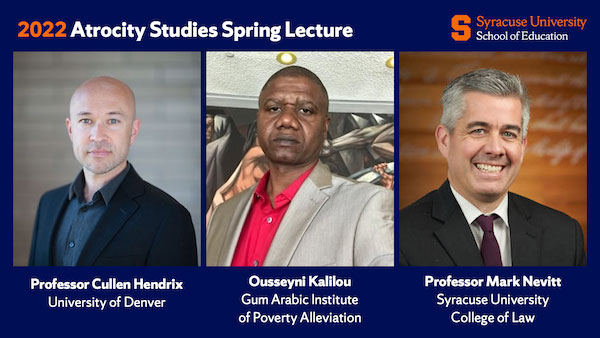Atrocity Studies Annual Lecture to Address Climate Change and International Security
Mar 24, 2022
|
Syracuse University School of Education
Syracuse, NY
View Original
During the 2022 Atrocity Studies Annual Lecture—presented by the School of Education—a panel of experts in environmental politics, law and security, and environmental peacebuilding will address climate change as a risk factor for mass atrocities, the national and international responses to this growing security threat and the impact of climate change on the African Sahel region.
“Climate Change and International Security: The Case of the Sahel” takes place in person on Thursday, March 24, at 5:30 p.m. in the Life Sciences Building, Room 001. The lecture also will be livestreamed. Details and Zoom registration can be found at go.syr.edu/soe/zell.
Addressing the human impacts of a changing climate will be Professor Cullen Hendrix of the Josef Korbel School of International Studies, University of Denver; Ousseyni Kalilou, CEO and Founder of the Gum Arabic Institute of Poverty Alleviation; and Professor Mark Nevitt of the College of Law.

This year’s lecture will make the critical connection between climate change and human and international security, says Julia M. White, an associate professor in the school’s Department of Teaching and Leadership and director of the Atrocity Studies and the Practices of Social Justice minor program.
“Syria experienced a severe drought and subsequent water crisis that spiked food prices, devastated agriculture and displaced over a million people, and although this alone was not the cause of its civil war, it was certainly an important factor driving the conflict,” explains White. “Climate change, increased migration, and struggles to control scarce resources will continue to destabilize governments and drive armed conflict and atrocities.”
The UN Office of the High Commissioner for Human Rights reports that temperatures in the Sahel ecoregion are rising 1.5 times higher than the global average, rainfall is decreasing, there is increased food scarcity, greater flooding, and rising sea levels in coastal regions—all pushing forced and sometimes dangerous displacement and migration, as well as armed conflict. “What is happening in the Sahel is a clarion call to work to mitigate the impacts of climate change and adapt to the current changed climate,” says White.
“During the lecture, Dr. Hendrix will address food insecurity and the risks of atrocities associated with climate change, while Professor Nevitt will focus on climate change’s legal issues and its role as a threat accelerant,” says White. “Ousseyni Kalilou will speak about the impacts of environmental degradation on the Sahel and how its inhabitants are using the environment and its natural resources as tools for peacebuilding.”
Supported by Lauri ’77 and Jeffrey Zell ’77, the annual spring lectures convene speakers from disciplines at the intersection of history, memory and international human rights. The lectures fundamentally ask how we can use the lessons of the past to inform and improve our world.
The 2022 lecture is co-sponsored by the following Syracuse University schools, colleges, departments, and programs: Campbell Public Affairs Institute; College of Arts and Sciences Department of African American Studies; College of Law Office of International Programs; Lender Center for Social Justice; Maxwell School programs of Citizenship and Civic Engagement, Social Sciences Ph.D., Master of Arts in International Relations, and Environment, Sustainability and Policy; Maxwell School departments of Economics, Geography and the Environment, History, and Political Science; Moynihan Institute of Global Affairs Maxwell African Scholars Union; the Program for the Advancement of Research on Conflict and Collaboration; and the School of Education.
